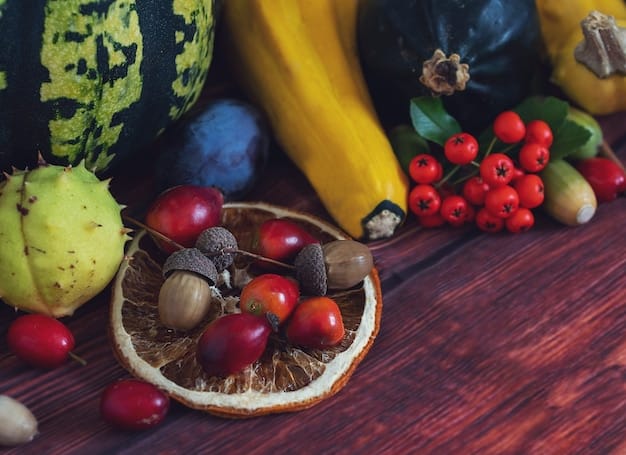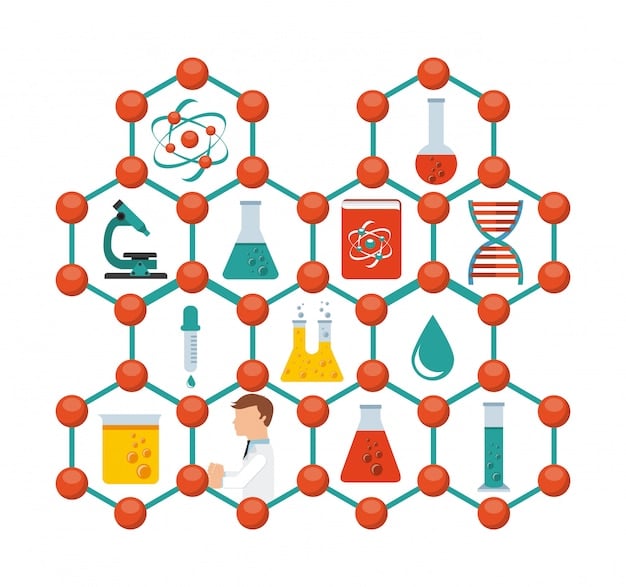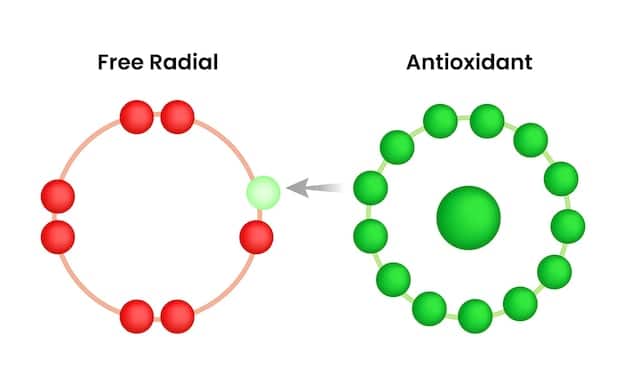Polyphenols: Unlocking the Antioxidant & Anti-inflammatory Power of Plants

Polyphenols are powerful plant-based compounds renowned for their antioxidant and anti-inflammatory properties, playing a crucial role in promoting overall health and preventing chronic diseases through various mechanisms like neutralizing free radicals and modulating inflammatory pathways.
Discover the potent antioxidant and anti-inflammatory benefits of polyphenols, naturally occurring compounds found in plant-based foods, and how they can contribute to your overall well-being.
What are Polyphenols? A Deep Dive into Plant Power
Polyphenols are a large family of naturally occurring organic compounds characterized by multiples of phenol units. Phenols are aromatic benzene rings that have at least one hydroxyl substituent (-OH). They’re synthesized by plants and other organisms and serve a range of functions, from protecting against herbivores and pathogens to contributing to plant pigmentation.
These compounds are found abundantly in various plant-based foods, including fruits, vegetables, tea, coffee, chocolate, and wine, lending these food items their distinctive colors, flavors, and aromas. Within the broader category of polyphenols exist several subclasses, each with a unique chemical structure and set of properties.

Classification of Polyphenols
Polyphenols are classified into different groups based on their chemical structure. The main categories include:
- Flavonoids: The most abundant group, found in fruits, vegetables, and beverages like tea and wine. Examples include quercetin, kaempferol, and catechins.
- Phenolic acids: Found in fruits, vegetables, and grains. Examples include caffeic acid, ferulic acid, and gallic acid.
- Stilbenes: Found in grapes and peanuts. Resveratrol is a well-known example.
- Lignans: Found in seeds, grains, and vegetables. Examples include secoisolariciresinol and matairesinol.
Common Sources of Polyphenols
Incorporating a variety of polyphenol-rich foods into your diet can be easier than you think. Here are some excellent sources:
- Berries (blueberries, raspberries, strawberries)
- Grapes (red and purple varieties)
- Apples
- Citrus fruits
- Tea (green, black, and white)
- Coffee
- Dark chocolate
- Nuts and seeds
- Legumes
Polyphenols are diverse compounds that play essential roles in plants and offer potential health benefits when consumed as part of a balanced diet. Their classification and ubiquity in plant-based foods make them an exciting area of study in nutrition science.
Antioxidant Properties: Fighting Free Radicals
One of the most celebrated attributes of polyphenols is their potent antioxidant activity. Antioxidants are molecules that can neutralize free radicals, unstable atoms or molecules that can damage cells, proteins, and DNA. Free radicals are produced as a byproduct of normal metabolism and are also generated by external factors such as pollution, radiation, and smoking.
When free radicals accumulate in the body, they can trigger a process called oxidative stress, which is implicated in the development of various chronic diseases, including heart disease, cancer, and neurodegenerative disorders. Polyphenols step in to combat this damage through several mechanisms.
How Polyphenols Act as Antioxidants
The antioxidant activity of polyphenols stems from their ability to:
- Donate electrons: Polyphenols can donate electrons to neutralize free radicals, stabilizing them and preventing them from causing further damage.
- Scavenge free radicals: They can directly react with free radicals, converting them into less harmful substances.
- Chelate metal ions: Some polyphenols can bind to metal ions, preventing them from participating in reactions that generate free radicals.
Impact on Oxidative Stress
By counteracting oxidative stress, polyphenols help protect cells and tissues from damage. This protective effect contributes to the prevention of chronic diseases.

The role of polyphenols as antioxidants is critical in maintaining cellular health and reducing the risk of chronic diseases linked to oxidative stress.
The Anti-inflammatory Effects of Polyphenols
Inflammation is a complex biological response to harmful stimuli, such as pathogens, damaged cells, or irritants. While acute inflammation is a necessary defense mechanism, chronic inflammation can contribute to the development of numerous diseases, including arthritis, inflammatory bowel disease, and cardiovascular conditions.
Polyphenols have demonstrated significant anti-inflammatory properties, making them valuable in managing and preventing chronic inflammatory conditions.
Modulating Inflammatory Pathways
Polyphenols exert their anti-inflammatory effects by influencing various signaling pathways involved in the inflammatory response. These include:
- Inhibition of pro-inflammatory enzymes: Polyphenols can inhibit enzymes such as cyclooxygenase (COX) and lipoxygenase (LOX), which are involved in the production of inflammatory mediators like prostaglandins and leukotrienes.
- Suppression of inflammatory cytokines: They can reduce the production of pro-inflammatory cytokines, such as tumor necrosis factor-alpha (TNF-α) and interleukin-6 (IL-6), which are key drivers of inflammation.
- Activation of anti-inflammatory pathways: Polyphenols can activate pathways that promote the resolution of inflammation, such as the nuclear factor erythroid 2-related factor 2 (Nrf2) pathway.
Reducing Inflammation in the Body
By modulating these inflammatory pathways, polyphenols help to reduce inflammation throughout the body. This can have significant benefits for conditions characterized by chronic inflammation.
The anti-inflammatory effects of polyphenols highlight their potential as therapeutic agents for managing inflammatory diseases and promoting overall health.
Polyphenols and Cardiovascular Health
Cardiovascular disease (CVD) remains a leading cause of death worldwide. Factors such as high blood pressure, high cholesterol, and inflammation contribute to the development of CVD.
Several studies have investigated the role of polyphenols in promoting cardiovascular health. Their antioxidant and anti-inflammatory properties are thought to play a significant role in protecting against CVD.
Improving Blood Vessel Function
Polyphenols can improve the function of blood vessels through several mechanisms:
- Enhancing nitric oxide production: Nitric oxide is a molecule that helps relax blood vessels, improving blood flow. Polyphenols can stimulate the production of nitric oxide, leading to better vascular function.
- Protecting against LDL oxidation: LDL cholesterol oxidation contributes to the formation of plaque in arteries. Polyphenols can prevent LDL oxidation, reducing the risk of atherosclerosis.
- Reducing blood pressure: Some polyphenols have been shown to lower blood pressure, a major risk factor for CVD.
Lowering Cholesterol Levels
Certain polyphenols have demonstrated the ability to lower cholesterol levels, particularly LDL cholesterol. This effect contributes to the prevention of atherosclerosis and reduces the risk of heart attacks and strokes.
The benefits of polyphenols for cardiovascular health are profound, making them valuable components of a heart-healthy diet.
Polyphenols and Cancer Prevention
Cancer is a complex disease characterized by uncontrolled cell growth. Several factors, including genetic predisposition, environmental exposures, and lifestyle choices, contribute to cancer development.
Polyphenols have been investigated for their potential role in cancer prevention. Their antioxidant and anti-inflammatory properties, along with other mechanisms, may help protect against cancer.
Inhibiting Cancer Cell Growth
Polyphenols can inhibit cancer cell growth through various mechanisms:
- Inducing apoptosis: Apoptosis, or programmed cell death, is a natural process that eliminates damaged or abnormal cells. Polyphenols can induce apoptosis in cancer cells, preventing them from proliferating.
- Inhibiting angiogenesis: Angiogenesis, the formation of new blood vessels, is essential for tumor growth. Polyphenols can inhibit angiogenesis, limiting the supply of nutrients to tumors.
- Modulating cell signaling pathways: They can interfere with signaling pathways that promote cancer cell growth and survival.
Protecting DNA from Damage
By neutralizing free radicals and reducing oxidative stress, polyphenols can protect DNA from damage. This protective effect reduces the risk of mutations that can lead to cancer.
The potential of polyphenols in cancer prevention is a promising area of research, highlighting the importance of incorporating polyphenol-rich foods into a cancer-preventive diet.
Incorporating Polyphenols into Your Diet
Consuming a diet rich in polyphenols is a proactive step toward improving your overall health. While supplements are available, the best way to reap the benefits of polyphenols is through whole foods.
Here are some practical tips for incorporating more polyphenols into your diet:
Choosing Polyphenol-Rich Foods
Prioritize whole, plant-based foods that are known to be high in polyphenols. Some excellent choices include:
- Berries: Enjoy a daily serving of blueberries, raspberries, or strawberries.
- Fruits: Include apples, grapes, and citrus fruits in your regular diet.
- Vegetables: Incorporate leafy greens, broccoli, and onions into your meals.
- Beverages: Drink green tea, coffee, or red wine in moderation.
- Snacks: Snack on dark chocolate, nuts, and seeds.
Cooking and Preparation Methods
How you prepare and cook your food can influence the polyphenol content. Some tips to keep in mind:
- Eat raw when possible: Many polyphenols are heat-sensitive, so consuming raw fruits and vegetables preserves their polyphenol content.
- Steam or lightly cook vegetables: If cooking is necessary, steaming or lightly cooking vegetables is preferable to boiling, which can leach out polyphenols.
- Store food properly: Store fruits and vegetables in a cool, dark place to preserve their polyphenol content.
By making informed food choices and adopting appropriate cooking methods, you can easily boost your polyphenol intake and enjoy the associated health benefits. A balanced and varied diet rich in plant-based foods is a cornerstone of good health.
| Key Point | Brief Description |
|---|---|
| 🌿 Antioxidant Power | Neutralize free radicals, preventing cell damage. |
| 🔥 Anti-inflammatory | Modulate inflammatory pathways, reducing chronic inflammation. |
| ❤️ Cardio Health | Improve blood vessel function and lower cholesterol. |
| 🍎 Food Sources | Berries, green tea, apples, & dark chocolate. |
Frequently Asked Questions
▼
Foods like berries, dark chocolate, red wine, tea, plums, onion, apples, pomegranate, and beans are rich sources of polyphenols. Consuming a variety of these can help maximize your intake.
▼
While generally safe, excessive intake of polyphenols, especially through supplements, may cause digestive issues. It’s better to get them from a diverse diet, in moderation.
▼
Polyphenols can aid weight management by improving metabolism and reducing inflammation. However, they should be part of a balanced diet and active lifestyle.
▼
Some individuals may experience mild gastrointestinal discomfort or headaches when consuming high doses of polyphenols. Starting with small amounts can help mitigate these effects.
▼
Polyphenols protect heart health through antioxidant effects that prevent oxidation of LDL cholesterol. They also help regulate blood pressure and blood clotting, reducing cardiovascular risk.
Conclusion
In conclusion, polyphenols are powerful compounds found in plant-based foods that offer significant antioxidant and anti-inflammatory benefits. By incorporating a variety of polyphenol-rich foods into your diet, you can promote overall health and reduce the risk of chronic diseases. From supporting cardiovascular health to protecting against cancer, the versatility of polyphenols makes them an invaluable asset in a healthy lifestyle. The benefits of including these natural compounds in your diet will contribute considerably to your overall health.





